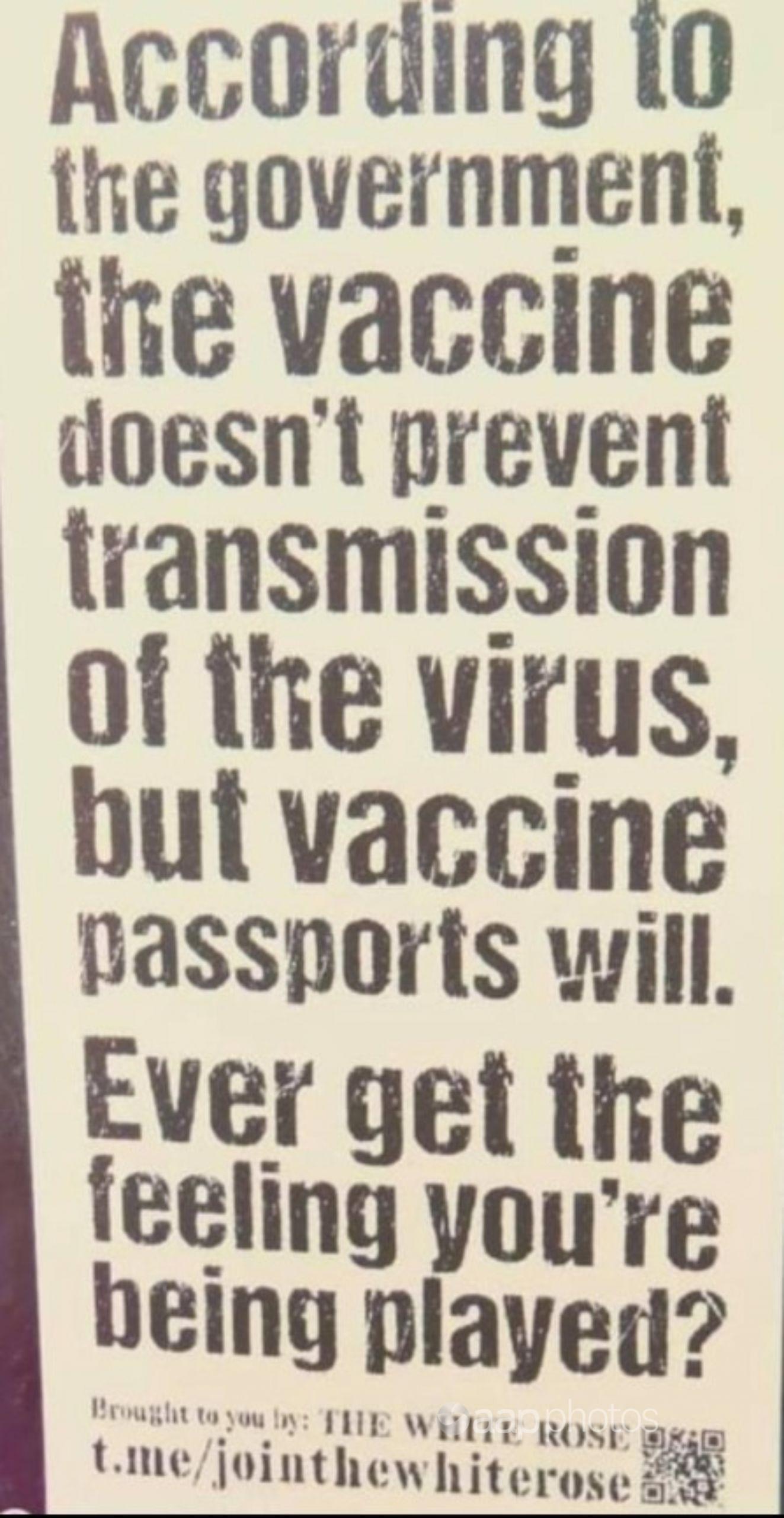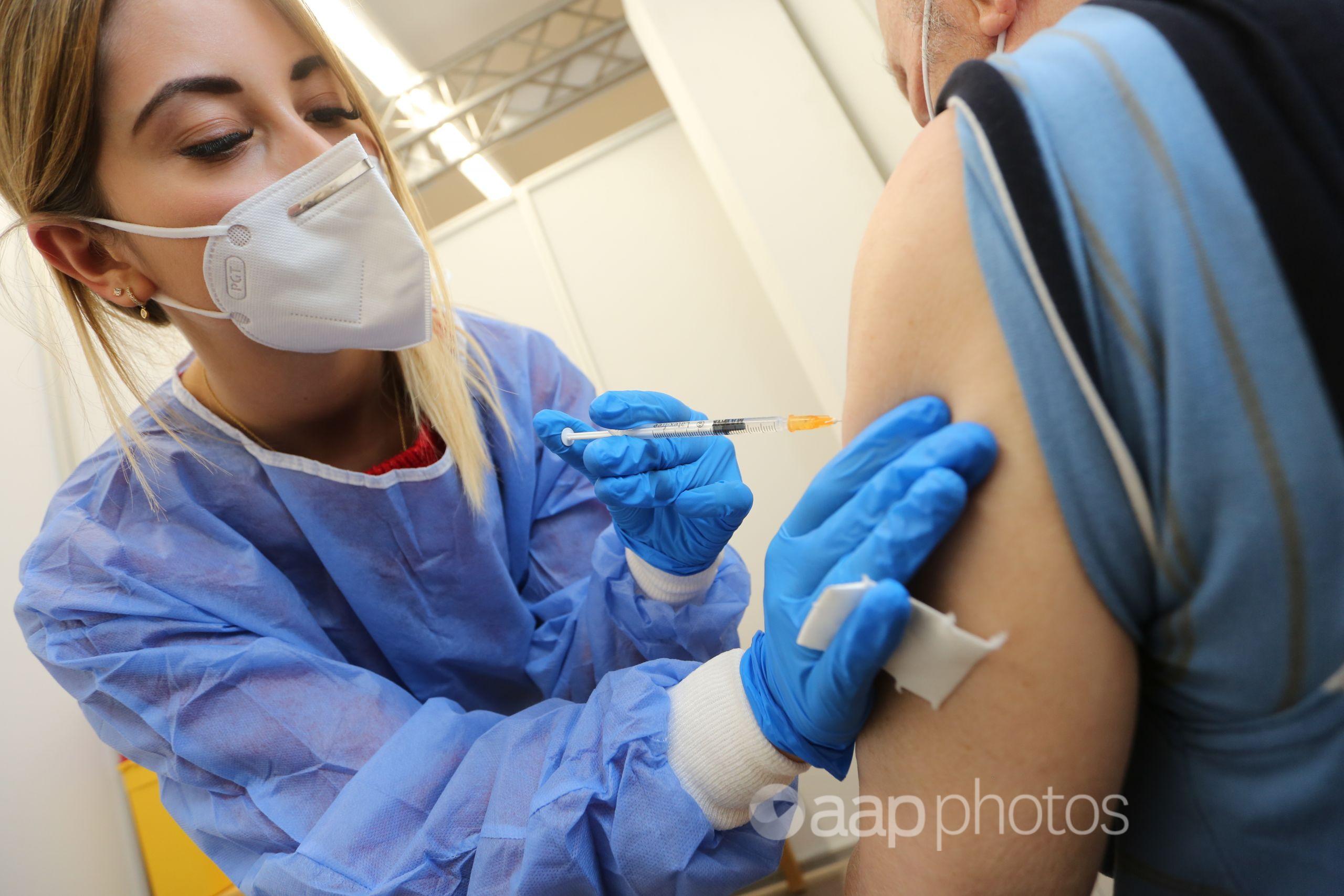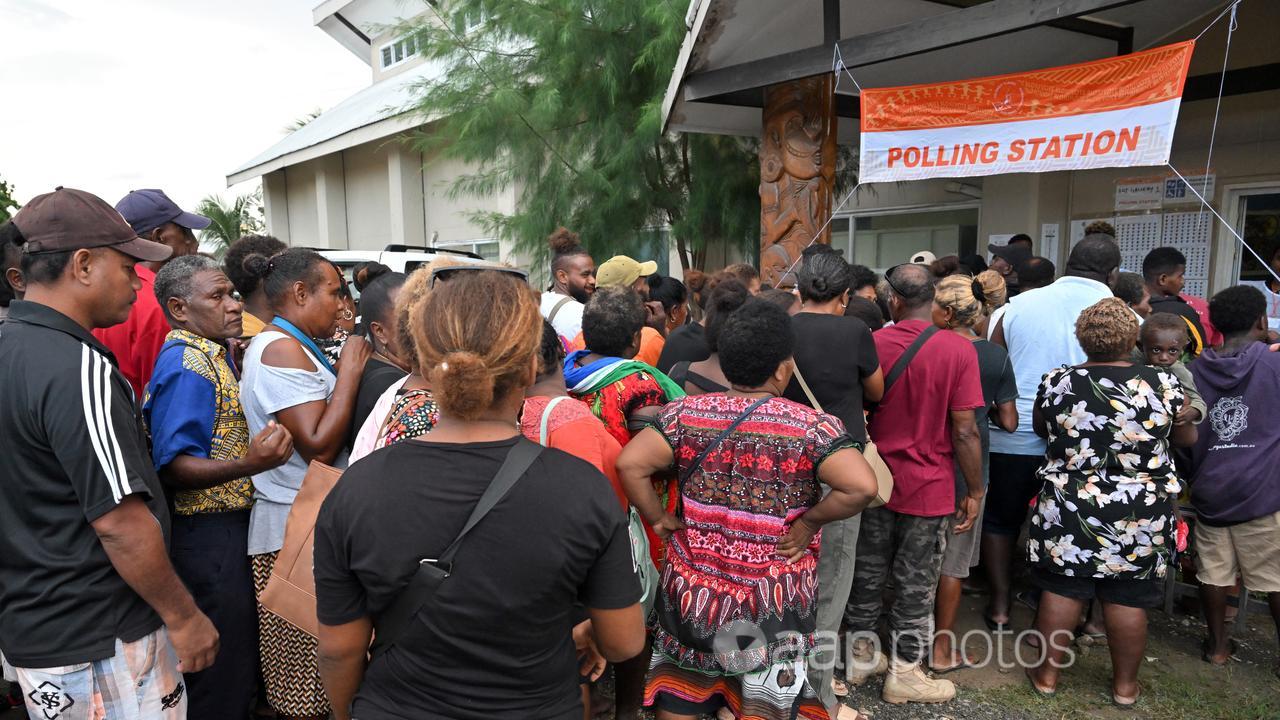January 12, 2022: Editor’s Note – This fact check and its verdict are based on the information available to AAP FactCheck at the time of publication in June 2021. Since this time, COVID-19 vaccines have been shown to have reduced efficacy in preventing infection with new variants of SARS-CoV-2, particularly the Omicron variant.
The Statement
Social media posts suggest people are being misled about the usefulness of COVID-19 vaccinations because the treatments do not stop transmission of the coronavirus.
Former One Nation candidate Emma Eros posted a related image to Facebook, the text of which reads: “According to the government, the vaccine doesn’t prevent transmission of the virus, but vaccination passports will. Ever get the feeling you’re being played?” At the time of writing, the May 24 post had been shared more than 200 times.
Similar suggestions that vaccines do not stop the virus from infecting vaccine recipients or spreading have been shared widely elsewhere. One post by an Australian Facebook page claims many people “fail to see any benefit from a supposed vaccine that neither prevents the spread nor prevents infection of this virus”.
A cartoon, shared by a New Zealand Facebook user on May 22, also implies the vaccine does not provide immunity to recipients, while an Instagram meme, posted by an Australian user on May 11, suggests vaccinations will not stop people from catching COVID-19 or passing it on to others.

The Analysis
Multiple scientific studies have concluded that COVID-19 vaccines dramatically reduce the chance of getting infected with the coronavirus, with research also indicating they cut the risk of onward transmission.
Immunology experts told AAP FactCheck that no vaccine is 100 per cent effective at preventing infection or transmission, however vaccines have been highly successful to date at combating the virus.
Two COVID-19 vaccines have been approved for use in Australia: the Pfizer/BioNTech vaccine and the Oxford/AstraZeneca vaccine.
The Pfizer vaccine has been found to be 95 per cent effective at reducing symptomatic COVID-19, according to the pharmaceutical company’s initial large-scale clinical trial. The efficacy rate means fully-vaccinated trial participants were much less likely to develop symptomatic cases of laboratory-confirmed COVID-19 when compared to unvaccinated participants who received placebo injections.
The result of the Pfizer trial has since been supported by real-world data from Israel’s vaccination rollout, published in The Lancet on May 15, which found full vaccination to be 95.3 per cent effective in preventing infection with SARS-CoV-2, the virus that causes COVID-19. The figures also showed the vaccine to be 91.5 per cent effective at preventing asymptomatic infection.
Clinical trials of the AstraZeneca vaccine in 2020 suggested it offered lower levels of protection, with researchers finding the AstraZeneca jab was 70.4 per cent effective in preventing symptomatic COVID-19 after two doses.
However, a preprint study published in April by medical experts from the University of Oxford found the Pfizer and AstraZeneca vaccines offered similar levels of protection from SARS-CoV-2 infection. Both offered a 70 per cent reduction in the chance of a new infection, with the figure rising to 88 per cent for infections with strong evidence of “viral shedding“.
Jennifer Juno, a postdoctoral researcher at Melbourne’s Peter Doherty Institute for Infection and Immunity, told AAP FactCheck that “no vaccine is 100 per cent effective at stopping infection” but COVID-19 vaccines were so far proving very successful.
“The currently licensed vaccines are all highly effective at preventing severe COVID-19 disease or death, which will save many lives,” Dr Juno said in an email.
“Additionally, vaccines are effective at preventing people from becoming ill (symptomatic infection) or from becoming infected at all (including asymptomatic infection), which means that the vaccine not only benefits the person being vaccinated, but also those around them.”
The World Health Organization says COVID-19 vaccines mean recipients are less likely to infect people around them, while the US Centers for Disease Control and Prevention says early data shows vaccines help prevent people with no symptoms from spreading the illness – although researchers are still learning how well the vaccines work in stopping transmission.
Associate professor Nathan Bartlett, a viral immunology expert at the University of Newcastle’s School of Biomedical Sciences and Pharmacy, told AAP FactCheck the primary objective of vaccination “is to protect you from severe disease (and) keep you out of hospital, thereby protecting health care systems”.
“There are many non-COVID vaccines covering different types of diseases, but COVID vaccines look to be amongst the most effective in terms of reducing transmission,” Dr Bartlett said in an email.
It is still possible for vaccinated people to catch COVID-19, such as six people who recently tested positive in Sydney hotel quarantine despite being vaccinated overseas and eight vaccinated members of the New York Yankees baseball team who contracted the virus in May. However, cases of people contracting COVID-19 after vaccination are both relatively rare and expected by experts.
Current evidence also suggests these “vaccine breakthrough cases” carry a lower viral load than unvaccinated people who become infected, and are less likely to pass on the virus.
“This does mean that the vaccines do not completely (100 per cent) stop viral transmission, but that was unlikely to ever be the case,” Dr Juno told AAP FactCheck.
In an article for The Conversation, University of Cambridge immunologist Sarah Caddy said producing a vaccine that entirely prevents infection and transmission – known as “sterilising immunity” – is often the goal of vaccine design, but this was extremely difficult to achieve.
“Fortunately, this hasn’t stopped many different vaccines substantially reducing the number of cases of virus infections in the past,” Dr Caddy wrote. “By reducing disease levels in individuals, this also reduces virus spread through populations, and this will hopefully bring the current pandemic under control.”
The Australian government accepts that vaccination may not fully protect everyone from infection. Instead, it says it aims to achieve herd immunity by immunising enough of the population to stop the disease from spreading.
“We seek herd immunity,” Health Minister Greg Hunt told The Age newspaper in January. “(But) that outcome will depend on the longevity of protection, the coverage of the population (expected to be high by global standards in Australia), and the impact on transmission, which are yet to be determined for any vaccine.”
AAP FactCheck could find no evidence the Australian government has said vaccine passports — digital verification that a person has been vaccinated — would stop transmission of the virus, as claimed in the Facebook post.
The Verdict
The Facebook post’s suggestion that vaccines do not prevent people from becoming infected with COVID-19 or transmitting the virus to others omits some key facts. While it is true that immunised people can still catch and spread the virus, vaccines have been shown to drastically cut infection rates and therefore reduce onward transmission. Experts say no vaccine is 100 per cent effective in preventing infection with or transmission of a virus.
Missing Context – Content that may mislead without additional context.
* AAP FactCheck is an accredited member of the International Fact-Checking Network. To keep up with our latest fact checks, follow us on Facebook and Twitter.
All information, text and images included on the AAP Websites is for personal use only and may not be re-written, copied, re-sold or re-distributed, framed, linked, shared onto social media or otherwise used whether for compensation of any kind or not, unless you have the prior written permission of AAP. For more information, please refer to our standard terms and conditions.


















